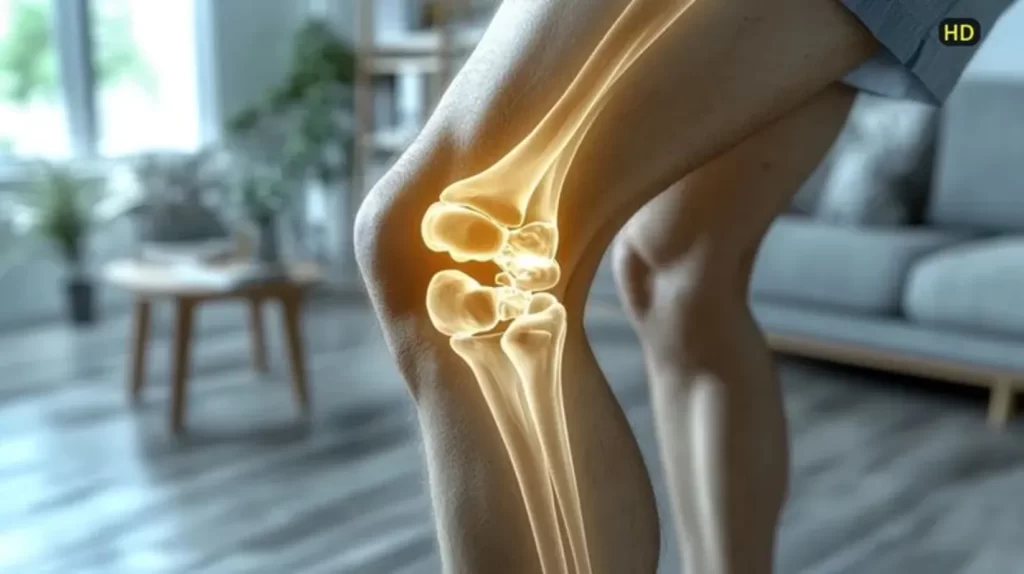Total Knee Replacement: Everything You Need to Know
Severe knee arthritis can be life-limiting, causing constant pain, stiffness, and a loss of independence. When medications, physiotherapy, and other conservative treatments no longer provide relief, total knee replacement becomes a highly effective option.
It is a well-established surgical procedure that not only relieves pain but also restores mobility and improves overall quality of life. For many patients, it offers a new lease on life – free from chronic knee discomfort.
What is Total Knee Replacement?
Total Knee Replacement (TKR), or total knee arthroplasty, is a surgery. It helps restore function and relieve pain in badly damaged knee joints. It involves taking out the worn or damaged surfaces of the knee joint. Surgeons replace these surfaces with artificial parts called implants or prostheses.
Manufacturers typically make these implants from metal alloys, high-grade plastics, or polymers. The goal is to copy the smooth and natural movement of a healthy knee. This will help remove the pain from bone-on-bone contact in advanced arthritis.
Many people mistakenly believe that doctors remove the entire knee. In reality, surgeons only remove a few millimeters of damaged bone and cartilage. They take this from the femur (thigh bone), tibia (shin bone), and sometimes the underside of the kneecap (patella). They then resurface these surfaces with prosthetic components that fit precisely.
Who Needs Total Knee Replacement?
Total Knee Replacement is a life-changing surgery for people with severe knee pain. This pain can affect daily activities and lower their quality of life. Experts often recommend non-surgical treatments. These include medications, physical therapy, lifestyle changes, or injections if other options fail.
Common Conditions Requiring Total Knee Replacement:
Osteoarthritis:
The most common reason for knee replacement surgery. It is a degenerative joint disease caused by the breakdown of joint cartilage over time. Osteoarthritis results in joint pain, stiffness, swelling, and reduced mobility.Rheumatoid Arthritis:
An autoimmune condition where the body’s immune system attacks the joint lining, leading to chronic inflammation, cartilage damage, and eventual joint deformity.Post-Traumatic Arthritis:
Develops after a serious knee injury. Fractures, ligament damage, or meniscus tears can lead to cartilage degeneration over time, resulting in chronic pain and stiffness.
Patients eligible for Total Knee Replacement typically have:
Persistent knee pain that interferes with sleep and mobility
Difficulty walking, climbing stairs, or getting up from a seated position
Knee deformities like bowlegs or knock-knees
Limited knee function despite trying medications and physiotherapy
Patient selection is a critical factor in the success of this surgery. Age, activity level, overall health, and the severity of joint damage all play a role in determining who would benefit most from TKR.

Recovery and Rehabilitation
Recovery from total knee replacement varies from person to person, but it follows a generally predictable path. With proper care and rehabilitation, most patients regain significant mobility and experience a dramatic reduction in pain.
Hospital Stay and Early Recovery:
- Most patients begin walking with assistance within 24–48 hours after surgery.
- The typical hospital stay lasts 3–5 days, depending on individual progress and medical conditions.
- Pain management, wound care, and early mobilization are key during this phase.
Physiotherapy:
Rehabilitation starts almost immediately and is essential for a successful outcome. Physical therapy helps:
Strengthen the quadriceps and hamstring muscles around the knee
Improve joint flexibility and range of motion
Reduce swelling and stiffness
Restore balance and gait mechanics
Recovery Timeline:
Weeks 1–2: Begin walking with a walker or crutches, perform simple exercises, and manage pain and swelling.
Weeks 3–6: Increased walking endurance, stair climbing, and basic self-care tasks.
Weeks 6–12: Most patients walk unaided, return to light work or household activities, and engage in low-impact exercises.
3–6 months: Full range of motion and pain-free function is typically achieved.
Recovery requires commitment to physiotherapy, home exercises, and lifestyle adjustments. The effort put into rehabilitation significantly affects long-term success.
Are There Any Risks in Total Knee Replacement ?
Like all major surgical procedures, TKR involves certain risks and potential complications. However, it remains one of the most successful and commonly performed orthopedic surgeries worldwide, with over 90–95% of patients reporting improved pain relief and joint function.
Potential Risks Include:
Infection: May occur in the wound or around the prosthesis. Preventive antibiotics and sterile surgical techniques reduce this risk.
Blood Clots: Deep vein thrombosis (DVT) is a potential risk. Patients are often given blood thinners and encouraged to move early.
Implant Loosening or Wear: Over time, the implant may loosen or wear down. Modern materials have greatly extended implant lifespans.
Joint Stiffness: Can result from scar tissue buildup or inadequate rehabilitation.
Nerve or Blood Vessel Injury: Rare but possible complications during surgery.
Proper preoperative evaluation, surgeon experience, and adherence to postoperative instructions help minimize these risks and improve outcomes.

Advances in Surgical Techniques
The field of knee replacement surgery has seen remarkable advances over the last decade. These innovations aim to improve surgical accuracy, reduce recovery time, and enhance patient satisfaction.
Modern Surgical Techniques:
Minimally Invasive Surgery (MIS):
Involves smaller incisions and less disruption to surrounding muscles, resulting in quicker recovery, less pain, and smaller scars.Computer-Assisted Navigation:
Uses real-time imaging and sensors to guide the surgeon in positioning the implant with high precision.Robotic-Assisted Knee Replacement:
Provides a high degree of accuracy by customizing the procedure to the patient’s unique anatomy. It improves implant alignment and may extend the life of the implant.
Emerging Technologies:
Patient-Specific Implants:
Designed based on the patient’s anatomy using preoperative imaging. These customized implants may provide better fit and function.3D Printing:
Allows the production of custom surgical guides and implants, improving surgical efficiency and outcomes.Regenerative Medicine:
Includes stem cell therapy and biologic injections that may help delay the need for surgery in some cases or support tissue healing after surgery.
Final Thoughts
Total Knee Replacement is more than just a medical procedure – it’s a pathway to renewed independence, mobility, and quality of life. For individuals who suffer daily from debilitating knee pain, stiffness, and limited movement, TKR offers a safe and effective solution when other treatments have failed.
Why Consider Total Knee Replacement?
You can no longer enjoy daily activities due to knee pain.
Your symptoms affect sleep, work, or social life.
Conservative treatments (medication, injections, therapy) offer little to no relief.
You are emotionally and physically limited by your condition.
If you or someone you care about is living with chronic knee problems, it may be time to consult an orthopedic specialist. Early consultation can provide a clearer understanding of treatment options and help you make informed decisions.
A Second Chance at Life
Thanks to modern surgical techniques, implant technology, and personalized care, Total Knee Replacement today is safer, more effective, and more transformative than ever before. It offers not just pain relief, but the opportunity to walk, move, and live freely again.
Don’t let knee pain define your life. Take the first step; talk to an orthopedic expert and explore whether TKR could be the key to reclaiming your mobility and confidence.
MS., Ortho
Consultant Orthopedic and Joint Replacement Surgeon
Shifa Hospitals
